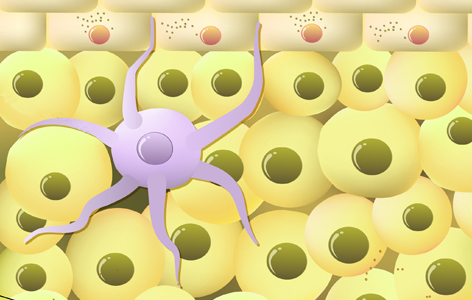
Tumours can suppress the immune system. They can secrete molecules that dampen the function of immune cells in the tumour's immediate environment. This strategy helps cancer evade the immune system and grow unabatedly. TGHRI Senior Scientist Dr. Mark Cattral has recently identified a new pathway through which these molecules can inhibit the function of two key mediators of the immune response: dendritic cells and T cells.
Dr. Cattral's research team demonstrated that tumours secrete molecules that activate the protein Toll-like receptor 2 (TLR2) in dendritic cells. The activation of the TLR2 protein and its pathway dampens the anti-tumour activity of dendritic cells and T cells. In an experimental model, the researchers showed that blocking tumour-mediated TLR2 activation not only enhanced the anti-tumour activity of both cells, but also promoted the proliferation of T cells and boosted the effectiveness of other cancer therapies, including a cancer vaccine.
Dr. Cattral's findings could lead to the development of new therapeutic strategies that could be administered in combination with existing cancer therapies to improve their efficacy and clinical outcomes.
This work was supported by the Canadian Institutes of Health Research, the Canadian Cancer Society, Astellas Pharma Inc., the Toronto General Hospital Transplant Program and the Toronto General & Western Hospital Foundation.
Toll-like receptor 2 activation promotes tumor dendritic cell dysfunction by regulating IL-6 and IL-10 receptor signaling. Tang M, Diao J, Gu H, Khatri I, Zhao J, Cattral MS. Cell Reports. 2015 Dec 29. [Pubmed abstract]




